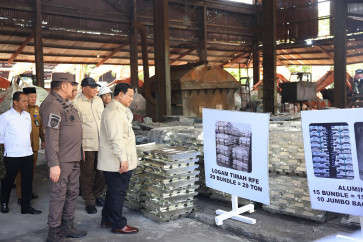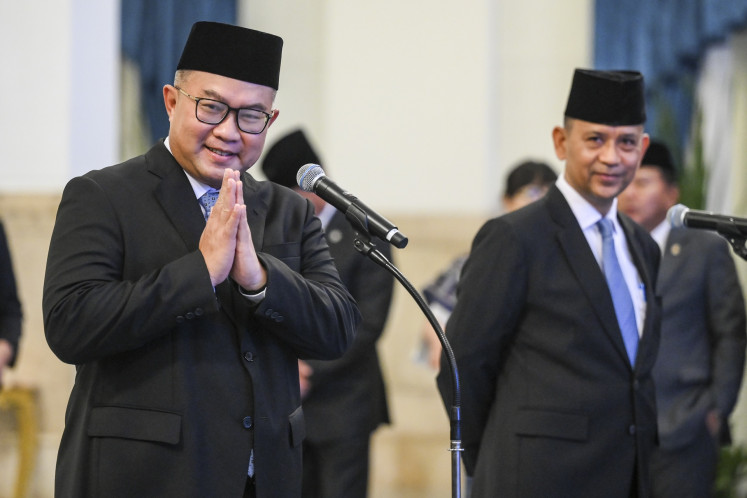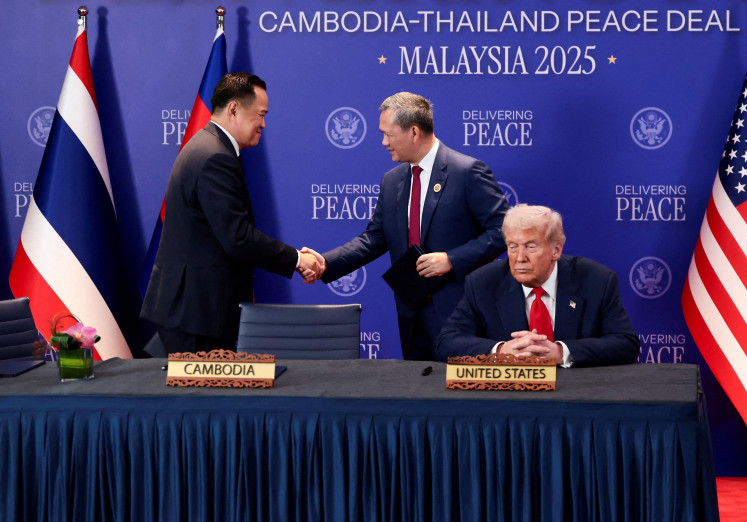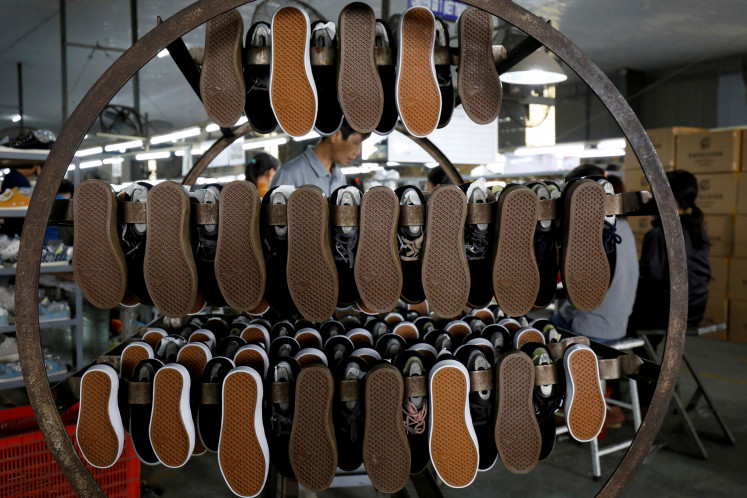Popular Reads
Top Results
Can't find what you're looking for?
View all search resultsPopular Reads
Top Results
Can't find what you're looking for?
View all search resultsIndependence for whom?
As is their wont, the media reported on the joyous celebrations of the 71st anniversary of Indonesian independence all the way from the village head’s office to the State Palace
Change text size
Gift Premium Articles
to Anyone
A
s is their wont, the media reported on the joyous celebrations of the 71st anniversary of Indonesian independence all the way from the village head’s office to the State Palace. There was no lack of ingratiating columnists expounding all of the “accomplishments” of successive administrations.
So overwhelming was the joy that it left no place in our thoughts for the millions of Indonesians mired in poverty. We conveniently forgot that by international standards, almost half of our brethren are still classified as poor.
Most disturbing was the “guesstimate” of our foremost experts that at least 3 million families had never been independent all these years. Why a guesstimate and not an actual head count? It is because inter-generational transmission of poverty simply doesn’t exist in our lexicon?
It has never been officially recognized, let alone studied in depth — not by statisticians who record poverty, nor by academicians lecturing upon poverty and neither by activists and donors who convene seminars on poverty.
It is much more convenient for the elite to lump it together with those labeled “the chronic poor”, as if this act of denial would make the inter-generational transmission of poverty go away.
In the early days of the republic, then president Sukarno managed to get an agrarian reform bill passed, but all his attempts to implement it were thwarted by the landlords on Java and the warlords controlling plantations in the regions.
Since then millions of hectares of forests have been converted to commercial exploitation, dispossessing native communities that had lived in harmony with nature for centuries.
The “civil servants” turned into “rapacious masters” and happily handed over these lands, which even the colonialists had preserved, to large corporations.
President Soeharto didn’t formulate any specific anti-poverty programs, but devoted a great deal of attention to the fundamentals: birth control, food and nutrition, health delivery, education and rural infrastructure.
During the 1970s, Indonesia managed to transform itself from the world’s largest importer to a nation self-sufficient in rice.
The system-wide drive encompassed high-yielding varieties, intermediate technology, quality extension, cost-of-living allowances, institution-building and guaranteed prices.
Lo and behold, the world had never witnessed such a rapid decline in rural poverty, as the increased incomes of the smallholders and higher wages of landless laborers managed to kick-start the rural economy. Massive meaningful employment was generated in providing goods and services to meet the demands of their now better-off brethren.
Why are we now in such dire straits? What went wrong? It turns out that this strategy was silently abandoned by the elite, which no longer wanted to be associated with the drudgery of farming. They preferred to be identified as “modern”, symbolized by advanced technology.
At the same time, our economists were misled by the international financial institutions (the International Monetary Fund, the World Bank and the Asian Development Bank) to believe that the unregulated market’s invisible hand would bring prosperity for all.
In short, they were persuaded to accept “trickle-down economics”, directing resources to the rich in the hope that they would generate employment for the people.
They failed to recognize that the much-touted globalization, technological change and pro-market reforms were actually the main drivers of rising inequality.
Furthermore, the adoption of neo-liberal trade and investment policies has led to a competitiveness and productivity performance depicted by world recognized economist Iwan Jaya Azis as “dismal”.
These mistaken beliefs unleashed forces that destroyed our environment, fostered persistent poverty leading to stunting and forced hundreds of thousands to leave their families and toil as “indentured laborers” abroad.
A number of visible hands colluded to promote widespread extraction of natural resources and a capital formation process that funneled more than half of the nation’s wealth into the hands of 1 percent of the population.
Instead of prosperity for all, what we are witnessing are Lamborghinis and Maseratis parading amid widespread poverty.
Not only is this extreme inequality constraining current growth, it is compromising the very survival of the republic.
Plagued by a shameless bureaucracy and political elite, what could be done to redress all these wrongs? Bold measures are needed if we don’t want to be counted among those who have continued the rhetoric of social justice while choosing the path of least resistance to protect their own interests.
If we really mean to lay the foundations for prosperity with dignity by 2045, then we have to adopt the “growth through equity” strategy.
This means that the development paradigm should preferably be people-driven, wherein all policies formulated, institutions established and technology either generated or transferred in, would be driven by the needs and capacities of the people.
In short, policy design would employ a “people lens”.
Inter-generational transmission of poverty cannot be dealt with effectively without addressing the root cause: the dearth and quality of resources — human, natural, financial and technological — controlled by poor households.
Indeed, we were shocked to recently learn from one of our leading dailies that a form of slavery exists to this very day on the island of Sumba. This is prima facie evidence that presidents, governors and regents have simply turned a blind eye and all of us held our silence while our brethren remained enslaved.
Nobody wants to be held accountable for this gross violation of human rights; indeed, naming scapegoats has become a national pastime.
In closing, let me quote US President Barack Obama: “A clear-eyed view of history can make us uncomfortable. It is precisely of that discomfort we learn and grow and harness our collective power to make this nation more perfect.”
Let us then, while there is still time, endeavor to provide meaning to the lives of millions of families who have been stoically enduring penury for generations.
_________________________________
The writer chaired the National Coordinating Agency for Poverty Alleviation in 2001










